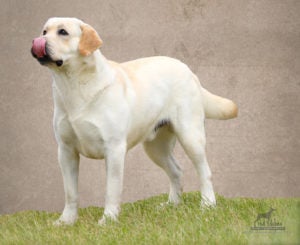
Labrador Retrievers are popular and versatile sporting dogs that make wonderful family companions and top athletes. Labrador Retrievers excel at retriever field trials, where they are tested on their retrieving skills and “learned abilities like steadiness, control, response to direction, and delivery of bird.”
So, the retriever community was rattled when these high-drive athletes started to experience episodes of collapse in the early 1990’s. The distinct condition, now known as Exercise-Induced Collapse or EIC, was originally seen in American-bred field trial Labradors. Thanks to dedicated breeders like Dr. Fran Smith DVM PhD DACT and research supported by the AKC Canine Health Foundation (CHF), breeders, owners, and veterinarians have a better understanding of the disease and tools to manage it.
Exercise-Induced Collapse
EIC is a heritable neuro-muscular disease caused by a mutation in the gene that codes for dynamin 1 protein (DNM1), which plays an important role in the transmission of nerve signals. Affected dogs show symptoms of weakness, incoordination, and collapse after five to 20 minutes of strenuous exercise. Episodes are not painful, and most dogs fully recover within five to 30 minutes.
Treatment consists of avoiding known triggers and activities. Most dogs have a good quality of life, albeit with limited exercise and excitement.

Smith grew up in the dog world, competed as a junior handler, and eventually started to breed Labrador Retrievers under the Danikk kennel name. Her academic achievements include a doctorate in small animal reproduction and board certification by the American College of Theriogenology. (Theriogenology is the branch of veterinary medicine concerned with reproduction.) An active leader and chair of the Health Committee for the Labrador Retriever Club Inc., Smith was very involved in the search for answers about EIC.
Samples from Danikk Labradors were used in CHF-funded research on EIC conducted at the University of Minnesota (Grant 00352: Genetic Basis of Exercise-Induced Collapse in Labrador Retrievers). Investigators identified the causative mutation in the DNM1 gene, and a genetic test is now available for EIC.
They also determined that EIC has an autosomal recessive mode of inheritance, meaning that two copies of the abnormal gene must be present for disease development. With autosomal recessive inheritance, breeding a normal dog with a carrier dog results in a 50% chance of producing carrier offspring, but zero chance of producing affected offspring. Since an accomplished and popular Labrador Retriever sire was likely a carrier of the EIC mutation, “This work provided a valuable lesson to the retriever community on how to manage a heritable disease without losing the desirable traits of this sire or other carriers,” Smith said.
As a dog lover, breeder, and veterinarian, Smith said “It is vital to have research on the health issues affecting dogs,” such as the EIC research supported by CHF. She remains actively involved in the process as the Labrador Retriever Club Health Committee Chair and through her work at the Orthopedic Foundation for Animals.
She supports CHF-funded research with personal donations and uses CHF’s tribute program (akcchf.org/tribute) to recognize clients and patients at her clinic, Smith Veterinary Hospital. She shares information on CHF in her lectures at veterinary schools and to dog groups and encourages dog owners to participate in the Purina Parent Club Partnership Program (akcchf.org/ppcp) so they can “support canine health research simply by feeding their dog.”
“CHF is the only organization that is directly working to improve canine health,” Smith said. “Over the past 25 years, the organization has grown in a positive direction, which is not the fate of all organizations.” As CHF celebrates its 25th anniversary during 2020, opportunities to collaborate with breeders and dog lovers like Smith will allow scientists to continue building upon previous discoveries and advance our knowledge of canine health and disease. Through these efforts and with your support, CHF works to advance the health of all dogs.
Learn how you can support CHF-funded research at akcchf.org/how-to-help.

